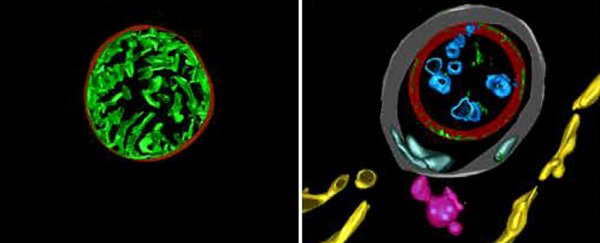Your relatives probably can't stop talking about how much you look like your mum or your dad, but the truth is, while you might have gotten your dad's eyes, you carry more of your mother's genes than your father's.
This is the case for every single person on Earth for one simple reason: the tiny organelles that live inside your cells, called mitochondria, are only passed down by your mum, and for decades, scientists couldn't figure out why.
Now a team from the University of Colorado Boulder say they've found a clue that could explain our strange lack of dad genes. "This is a very long-standing mystery in biology - why in so many organisms, [only] the maternal mitochondria are inherited," geneticist and lead researcher Ding Xue told Laurel Hamers at Science News.
Mitochondria are something you can't live without, because they're the energy-producing factories of the cell, responsible for converting the food you eat into the energy your cells need to function.
And they're also incredibly weird. As ecologist Madeleine Beekman from the University of Sydney in Australia explains, some 1.5 or 2 billion years ago, they were actually free-living organisms. So those things in your cells, they used to have a life of their own.
The ancestor of all mitochondria is a type of bacterium that was swallowed by another bacterium, and this monstrous creature gave rise to the eukaryotes. A eukaryote is any organism whose cells contain a nucleus and other organelles enclosed within membranes - so all plants, animals, and fungi alive today.
"Because of their evolutionary history as free-living bacteria, mitochondria have retained their own genome, called mitochondrial DNA, or mtDNA," says Beekman. "Each cell contains many copies of mtDNA, as mitochondria freely replicate within the cell."
Xue and his team observed the behaviour of mitochondria as it was transferred from the sperm of a worm species called Caenorhabditis elegans to a fertilised egg.
They watched as the mitochondria from the sperm was broken apart from the inside out, rendering it useless once it's transferred to the egg. It turns out that a protein found in sperm, called CPS-6, appears to be shredding the mitochondrial DNA apart, rendering the mitochondria itself useless.
A process called autophagy, which cleans up degraded cell parts to make way for newer, healthier ones, then takes over, helping to transport the remains of the paternal mitochondria out of the embryonic cells.
The team found that when mitochondrial DNA stuck around for longer than it should in embryos, it made them more likely to die, which suggests that the CPS-6 protein and autophagy process are working together to ensure the viability of an embryo.
"[T]he researchers speculate that it's evolutionarily advantageous for roundworms - and other organisms like humans - to do away with that extra dad DNA," says Arielle Duhaime-Ross at The Verge.
Of course, this assumption can't be proven until it's observed in humans, but we do produce a protein similar to CPS-6, and it plays a similar role in the process of autophagy as seen in these worms, so there's a good chance that this is what's happening in human embryos too.
So why would the body destroy paternal mitochondria anyway? The researchers aren't entirely sure, but Xue hypothesises that it carries the potential for more mutations than maternal mitochondria, so in evolutionary terms, it's more advantageous to just do away with it altogether.
"If mutated paternal mitochondrial DNA isn't removed promptly, then mutations can accumulate through generations," he told Duhaime-Ross.
The study has been published in Science.
